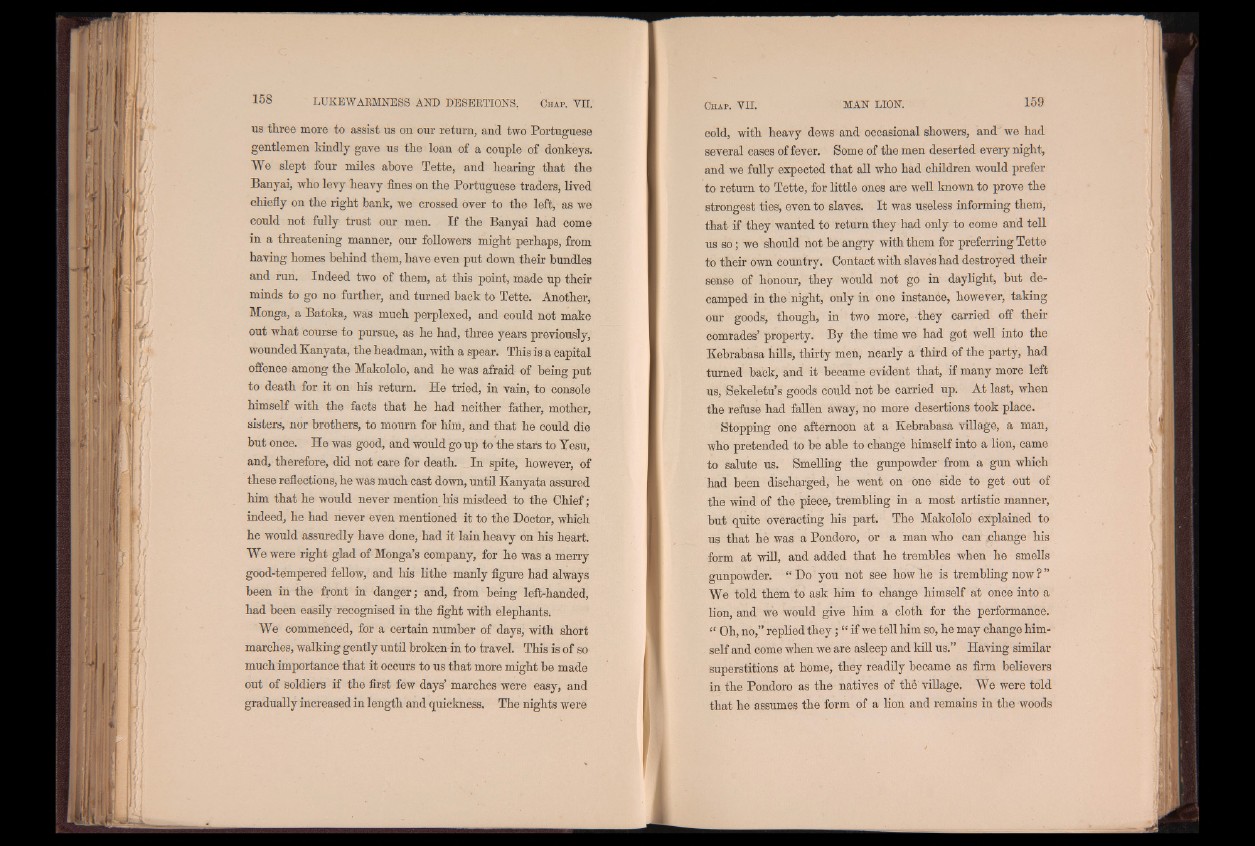
us three more to assist us on our return, and two Portuguese
gentlemen kindly gave us the loan of a couple of donkeys.
We slept four miles ahove Tette, and hearing that the
Banyai, who levy heavy fines on the Portuguese traders, lived
chiefly on the right bank, we crossed over to the left, as we
could not fully trust our men. If the Banyai had come
in a threatening manner, our followers might perhaps, from
having homes behind them, have even put down their bundles
and run. Indeed two of them, at this point, made up their
minds to go no further, and turned back to Tette. Another,
Monga, a Batoka, was much perplexed, and could not make
out what course to pursue, as he had, three years previously,
wounded Kanyata, the headman, with a spear. This is a capital
offence among the Makololo, and he was afraid of being put
to death for it on his return. He tried, in vain, to console
himself with the facts that he had neither father, mother,
sisters, nor brothers, to mourn for him, and that he could die
but once. He was good, and would go up to the stars to Yesu,
and, therefore, did not care for death. In spite, however, of
these reflections, he was much cast down, until Kanyata assured
him that he would never mention his misdeed to the Chief;
indeed, he had never even mentioned it to the Doctor, which
he would assuredly have done, had it lain heavy on his heart.
We were right glad of Monga’s company, for he was a merry
good-tempered fellow, and his lithe manly figure had always
been in the front in danger; and, from being left-handed,
had been easily recognised in the fight with elephants.
We commenced, for a certain number of days, with short
marches, walking gently until broken in to travel. This is of so
much importance that it occurs to us that more might be made
out of soldiers if the first few days’ marches were easy, and
gradually increased in length and quickness. The nights were
cold, with heavy dews and occasional showers, and' we had
several cases of fever. Some of the men deserted every night,
and we fully expected that all who had children would prefer
to return to Tette, for little ones are well known to prove the
strongest ties, even to slaves. It was useless informing them,
that if they wanted to return they had only to come and tell
us so ; we should not be angry with them for preferring Tette
to their own country. Contact with slaves had destroyed their
sense of honour, they would not go in daylight, but decamped
in the night, only in one instance, however, taking
our goods, though, in two more, they carried off their
comrades’ property. By the time we had got well into the
Kebrabasa hills, thirty men, nearly a third of the party, had
turned back, and it became evident that, if many more left
us, Sekeletu’s goods could not be carried up. At last, when
the refuse had fallen away, no more desertions took place.
Stopping one afternoon at à Kebrabasa village, a man,
who pretended to be able to change himself into a lion, came
to salute us. Smelling the gunpowder' from a gun which
had been discharged, he went on one side to get out of
the wind of the piece, trembling in a most artistic manner,
but quite overacting his part. The Makololo explained to
us that he was a Pondoro, or a man who can change his
form at will, and added that he trembles when he smells
gunpowder. “ Do you not see how he is trembling now ? ”
We told them to ask him to change himself at once into a
lion, and we would give him a cloth for the performance.
“ Oh, no,” replied they ; “ if we tell him so, he may change himself
and come when we are asleep and kill us.” Having similar
superstitions at home, they readily became as firm believers
in the Pondoro as the natives of thé village. We were told
that he assumes the form of a lion and remains in the woods